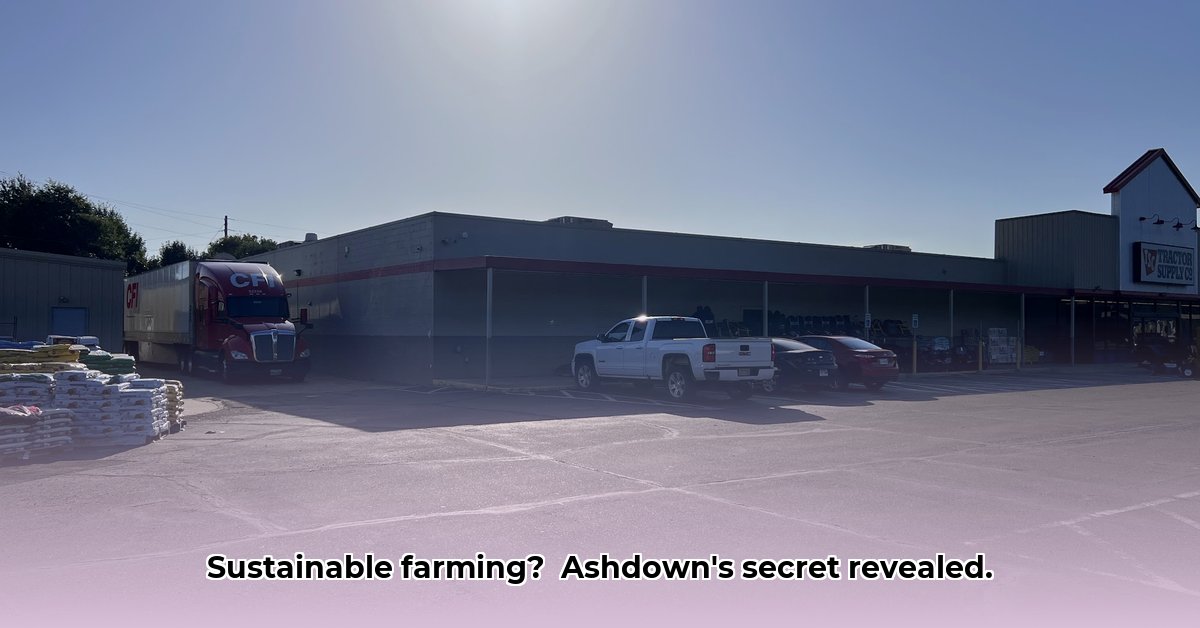
Tractor Supply Company (TSC) in Ashdown, Arkansas, plays a significant role in the local agricultural landscape. But how effectively does it support sustainable farming practices? This article examines TSC's current offerings, identifies opportunities for improvement, and addresses challenges in promoting sustainable agriculture within the Ashdown community. We'll explore actionable steps for TSC, local farmers, and consumers to cultivate a more environmentally responsible agricultural future. For more information on TSC's fertilizer options, check out their fertilizer page.
Tractor Supply's Current Offerings in Ashdown for Sustainable Agriculture
TSC Ashdown offers a range of products relevant to sustainable agriculture, including seeds, fertilizers, pest control solutions, tools, and livestock supplies. However, a critical evaluation requires deeper analysis than a simple inventory check. Key questions remain: What percentage of fertilizers are organic? What is the environmental impact of their pesticide options? How sustainable are their own supply chains and packaging materials? Transparent sourcing information and clear labeling are crucial for customers to make informed decisions aligned with sustainable practices. Without this transparency, assessing the true sustainability of TSC's contribution remains challenging. A recent report 1 highlights the company's broader ESG initiatives, but further granular data specific to the Ashdown location is needed for a more comprehensive assessment.
Opportunities for Improvement: A Roadmap to Greener Farming
Significant opportunities exist to enhance TSC's contributions to sustainable agriculture in Ashdown. These opportunities require concerted effort from multiple stakeholders.
Actionable Steps for Tractor Supply Ashdown
Short-Term (within 1 year):
- Enhanced Product Labeling: Implement clear and concise labeling of products with sustainable certifications (organic, biodynamic, etc.), enabling customers to easily identify environmentally friendly options.
- Employee Training: Equip staff with the knowledge to advise customers about sustainable farming practices and the advantages of eco-friendly products, including proper disposal methods.
- Customer Feedback Mechanisms: Establish robust systems for gathering customer feedback on sustainability needs and concerns to inform future inventory decisions.
Long-Term (3-5 years):
- Local Sourcing Partnerships: Develop relationships with local organic farms and suppliers to reduce transportation emissions and support the local economy.
- Environmental Initiatives: Invest in environmental sustainability measures within the store itself, such as renewable energy sources (e.g., solar panels), to reduce its carbon footprint.
- Community Education Programs: Sponsor educational workshops, webinars, or other initiatives to teach sustainable farming techniques to local farmers and gardeners.
Actionable Steps for Local Farmers
Short-Term (within 1 year):
- Product Evaluation: Carefully assess TSC's offerings to identify products consistent with their sustainable farming goals.
- Cost-Benefit Analysis: Compare the costs of sustainable products with conventional options, considering long-term benefits.
- Leverage Staff Expertise: Utilize TSC staff expertise to gain insights on products and practices that support their sustainable goals.
Long-Term (3-5 years):
- Gradual Transition: Gradually adopt sustainable practices, adjusting to product availability and refining strategies over time.
- Resource Utilization: Utilize resources and expertise gained through interactions with TSC to enhance sustainable farming strategies.
Actionable Steps for Consumers
Short-Term (within 1 year):
- Informed Purchasing: Carefully review product labels to identify sustainably sourced and manufactured products.
- Support Sustainable Businesses: Prioritize businesses that demonstrate a commitment to sustainability.
- Advocacy for Transparency: Advocate for clearer labeling to make informed purchasing decisions.
Long-Term (3-5 years):
- Policy Support: Support policies and initiatives promoting sustainable agriculture and land management.
- Community Engagement: Educate others on making sustainable purchasing choices, sharing knowledge and experiences.
Challenges and Knowledge Gaps: The Path Forward
Several challenges hinder a complete assessment of TSC's role in sustainable agriculture. Critical knowledge gaps exist regarding the environmental impact of their supply chains and packaging. Comprehensive life-cycle assessments (LCAs) are needed to provide a transparent picture of their overall footprint. Independent research can further clarify the long-term environmental effects of various products sold at TSC.
Conclusion: Building a Sustainable Future Together
TSC Ashdown possesses the potential to significantly impact sustainable farming practices in the community. However, realizing this potential demands complete transparency, strong collaboration among stakeholders, and a commitment to environmentally responsible initiatives. Open communication and data-driven efforts are crucial to effectively evaluate and enhance TSC's role in building a more sustainable agricultural future for Ashdown.